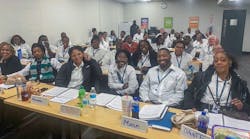The Bi-State Development Agency (St. Louis Metro) has made an effort to address continuing critical workforce shortages in the St. Louis region and is finding a steady uptick in the hiring of MetroBus and Metro Call-A-Ride operators joining the organization.
The trend is the result of a comprehensive, multi-faceted hiring initiative that is drawing more qualified candidates to apply, leading to more job offers being extended and helping to keep new hires on the job.
“Hiring and retaining workers in the current environment remains extremely challenging, yet we fully understand that new frontline workers, along with our valued current team members, are absolutely necessary to reliably move the St. Louis region,” said Charles Stewart, St. Louis Metro COO. “We finally seem to have enough tools in our chest to start to turn the tide.”
The next hiring event is scheduled for Jan. 13 and will be held at the Illinois MetroBus Facility. On-site interviews will be conducted for mechanics, Metro Call-A-Ride Van Operators, MetroBus Operators and MetroLink operators. Qualified candidates will receive on the spot job offers. All of the positions are eligible for St. Louis Metro's special $5,000 signing bonus, which is available through March 31.
Several other hiring initiative elements are also contributing to the more positive hiring trends. Among the other approaches the organization is using are:
- A switch in 2023 from quarterly to monthly hiring events that have been hosted at St. Louis Metro and partner facilities across the region and increased marketing efforts to drive attendance at those events as well as online applications.
- A new mentoring program that involves a partnership with the Amalgamated Transit Union International that pairs veteran transit operators with new hires to give them guidance, insight into their new position, to manage expectations and to move them forward toward a successful career.
- Updated training programs to better prepare new team members for their operator positions.
- A special $5,000 signing bonus for essential positions like MetroBus operators, MetroLink operators, Metro Call-A-Ride operators and mechanics has been extended through March 31.
- Increased participation in recruitment efforts at all levels by Transit Operations (Metro Call-A-Ride, MetroBus, MetroLink and Maintenance) and more consistent contact with applicants from the Talent Acquisition team.
- Increased wage benefits approved and in place for new and current MetroLink operators MetroBus operators and mechanics contract negotiations are underway for Metro Call-A-Ride operators, with the goal of raising wages for those operators.
In the past six months, St. Louis Metro notes the number of applicants offered operator positions on the spot at the hiring events has gone from 55 in June, to 72 in September, to 89 in October to 106 in November and 82 in December.
“For various reasons, ranging from failing a drug test to accepting another job, not everyone to whom an offer is extended ultimately ends up being hired and that just underscores how important it is for us to continue to grow the pipeline of people who will be a good fit for St. Louis Metro Transit and want a rewarding lifetime career with us,” Stewart said.
The success of these recruitment efforts is enabling St. Louis Metro to provide increased frequency on 17 MetroBus routes starting Jan. 15. Enough operators have been hired to support buses arriving at bus stops more frequently on St. Louis Metro’s higher ridership routes in the city of St. Louis and in St. Louis County. This is the first time that frequency has been increased since the COVID-19 pandemic began in 2020.



